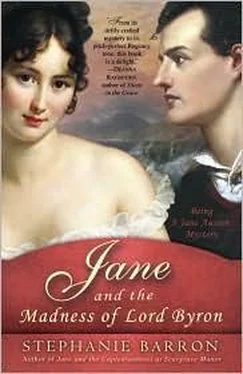My senses sharpened. “Has he been taken, then?”
“You did not know?” Desdemona sat up alertly in her chair, the fire in the hearth edging her profile in gold. “He was met at the door of his lodgings—he has rooms in Bennet Street, St. James’s—by the Brighton constabulary. Lady Oxford—her Christian name, like yours, is Jane—says Byron listened to them patiently, but when told he must return for the inquest, he kicked up a dust. One of the constables had his cork drawn, and another was tossed on his ear into the street, whereupon Byron remounted and rode directly to Mortimer House, the Oxford residence in Town. The constables followed, and it was the Earl of Oxford in the end who urged Byron to do their bidding—fearing, no doubt, a hideous scene at his very door. Adultery may be one thing—Oxford is accustomed to that —but murder is quite another.”
“And Lady Oxford?”
“—prepares to follow her heart. She wrote to beg a room here on the Marine Parade, and tho’ Swithin dislikes it, he has given way to my wishes.” She glanced affectionately at her husband, who was deep in conversation with Sir John and my brother. “He is an excellent husband, is he not? I never dreamt, during those distant days in Bath when Charles was disposed to be excessively disagreeable, intent upon winning every battle and making myself the object of his conquest—that I should be so content with my surrender!”
“I am glad to hear it,” I said; and meant it. Tho’ the Earl and his Countess had rarely met without quarreling in their salad days, it had been obvious to all who observed them that they were formed for each other. I envied them completely.
“Jane—I hope I may call you Jane?”
“Of course.”
“And you shall call me Mona. Everyone does.” She leaned towards me confidingly. “I shall not tax you to save Byron’s neck—he will come to a bad end regardless. No one can pursue so ruinous a course, in love and debt, without he ends in a sponging house or flight to the Continent. I will urge you, however, to pursue justice. Someone drowned Catherine Twining like a helpless kitten; and I cannot bear to think that such a horror should go unpunished. Even if it was Byron who killed her. We should be doing the world a service, in publishing the murderer’s ill fame—whoever he proves to be.”
“We?” I repeated dubiously. Justice was a far higher plane of talking for the Countess of Swithin, who had begun with mere ties of friendship to a woman whose morals I could not like.
“Well, naturally, I shall do my all to help you,” Mona said indignantly. “I may open any door in Brighton on your behalf; nothing is more easily done; and I should think it very good sport, to be frank, to be privileged to hear of your researches. Uncle used to tell me everything , you know.”
There; she had referred to him, despite herself.
“He even told me,” she said distinctly, “that he intended to marry you one day.”
My breath stopped in my throat; my face, I felt, was blazing. I wished of a sudden that I might run from the room, heedless of the Alleyns and Silchesters and Hodges who might stare after me, astonished and babbling; I wished only for darkness, and a soothing bout of tears.
“I wish that he had,” Mona persisted. “I wish that he had lived. I might have called you Aunt.”
“Pray, say no more,” I whispered.
“Will you do it? Will you find Catherine Twining’s murderer?”
“I cannot simply thrust myself in the way of an investigation, Mona.” I sighed in exasperation. “There are men charged with finding the truth. The magistrate, for one—and the coroner, for another.”
“The magistrate is Sir Harding Cross, who is intimate with the Regent—hence his token office,” Mona said shrewdly. “Sir Harding lives for the next race-meeting, considers himself a dashing blade, for all his stays creak when he attempts to bow; and is disinclined to bother himself very much in anybody’s death. He is a three-bottle-a-day man, too intent upon draining the last drop to attend to trifling affairs like a drowning. Rather than untangle this web, he would vastly prefer to charge Lord Byron with the deed—and have an end to it.”
“Then the truth will out at his lordship’s trial.”
“—Do you believe it? So do not I.” The Countess’s voice had sharpened. “Once Miss Twining is in her grave, any proofs that might have pointed to the culprit will have been neatly swept into the rubbish.”
“It is for her family to pursue justice, not a stranger.”
“The Jane Austen so valued by Lord Harold should never have hesitated to learn the whole!”
Her voice had risen, on this last; a few curious eyes turned in our direction; I observed Henry to set down his glass of Port with an audible clink. He looked as if he would approach; I shook my head slightly.
It was unfair of Mona to invoke, again, the Gentleman Rogue. I looked at her ladyship, whose grey eyes were as cool and satiric as Lord Harold’s own, and whose wits were certainly as sharp, and said, “But what if it was indeed Lord Byron who held Catherine Twining’s head beneath the waves? What shall you tell your friend Lady Oxford?”
“The truth,” Desdemona replied without hesitation. “It should, after all, be the salvation of her.”
Chapter 15 Evidence of an Undergroom
WEDNESDAY, 12 MAY 1813
BRIGHTON
THE CONSTABLES BROUGHT LORD BYRON BACK TO Brighton under cover of darkness last night, hoping, no doubt, to escape the notice of the general populace—but they reckoned without the avidity of the lower orders in all matters having to do with murder, and found to their discomfiture that the way into town was lined with torches and a gallery of faces four deep along the roadside. I observed some part of the chilling progress from my window at the Castle, for it was to this inn that his lordship was bound. He has not, it seems, been charged with murder or placed under arrest—merely summoned to appear at the coroner’s inquest—and thus could not be housed in Brighton’s gaol. The King’s Arms, it seemed, would not have his lordship back again—Mr. Scrope Davies, tho’ sympathetic, could not assure Byron’s safety in his private lodgings—and so his lordship was consigned to the comforts of our own temporary abode.
“Once the verdict is brought in at the inquest,” Henry mused as he stood beside me in the window, “he shall have to be placed under the 10th Hussars’ guard at Brighton Camp. No other place will hold him.”
We had a brief glimpse of the poet—dark head, dark clothes, and a face whose pallor was dreadful—as he limped from coach to Castle entry; and it required the combined efforts of four constables and a burly individual I took to be a Bow Street Runner, who brandished a pair of pistols and met the crowd jeer for jeer, for his lordship to achieve the door.
Who, I wondered, had hired the Runner as Byron’s guard—Lady Oxford, perhaps?
“When is the inquest to be?” I asked my brother.
“Tomorrow,” he replied. “They were waiting only for Byron.”
He left me then to my bed and my thoughts, which were so numerous and tangled as to keep me awake, long into the night.
HAVING FORMED NO PART IN THE DISCOVERY OF CATHERINE Twining’s body, I was not permitted to attend the inquest this morning; that was for the select company of the coroner, his chosen panel of local fellows, and the magistrate, Sir Harding Cross. The King’s Arms’ publican should be present, indeed; and the chambermaid who found poor Catherine; and Lord Byron, whose bed she had lain in; and General Twining, whose office it must be to confirm the identity of Deceased. Even Mr. Scrope Davies should be there—to swear on his oath that Byron had spent Monday night in his lodgings, and quitted them for London early Tuesday morning. All the oaths should avail Byron nothing; if Lady Swithin was to be credited, Sir Harding would make swift work of the business, and a verdict of willful murder should be returned against the poet. There was no very great loss in being barred from the inquest; Henry should have an account of it almost as soon as it was done, from the knowledgeable at Raggett’s Club.
Читать дальше












